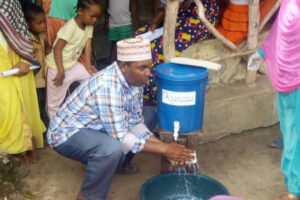Mr Nathan Belete is an Ethiopian national and a development professional with over 25 years of work experience across Africa, East Asia, and South Asia, it said in a statement.
He was previously the WB’s country director for Cabo Verde, The Gambia, Guinea-Bissau, Mauritania, and Senegal, based in Dakar.
Mr Belete will be based in Dar es Salaam from where he will oversee a portfolio of about $12.5 billion in total commitments for the four countries.
“This support covers priority areas of human capital, agriculture, infrastructure, private sector development, climate, and gender, among others,” it stated.
Prior to Mr Belete’s country director assignments, he managed the World Bank’s Food and Agriculture Global Practice in the East Asia and Pacific Region, based in Vietnam, from 2014 to 2019.
Prior to that, he was the sector manager for the WB’s Sustainable Development Department in Indonesia.
His career at the WB has included assignments in the WB’s country offices in Nairobi, New Delhi, and Beijing with responsibilities for investments and technical assistance activities in agriculture and rural development, among others.
Share this news
This Year’s Most Read News Stories

Villagers on Pemba Island lack clean sanitized water
Eight villages on Pemba Island have lacked clean and safe water service while complaining to the Zanzibar Water Authority for failing to solve the water problem in their villages.Continue Reading

‘Pilot error’ caused Precision Air crash
Reports says prevailing poor weather led to the pilots failing to heed warning signals.Continue Reading

Tanzania Declares Marburg Outbreak – Africa CDC Mobilizes Immediate Response

Addis Ababa, January 20, 2025</Strong> — Tanzania has declared a Marburg virus disease (MVD) outbreak after confirming one case and identifying 25 suspected cases in the Kagera Region of Northwestern Tanzania. The Marburg virus, a highly infectious and often fatal disease, is similar to Ebola and is transmitted to humans from fruit bats and monkeys. This outbreak marks the nation’s second encounter with the deadly virus, following the outbreak in Bukoba District of Kagera Region in March 2023, which resulted in nine cases and six deaths.
In response to this urgent threat, the Africa CDC is mobilizing strong support to help Tanzania contain the outbreak. A team of twelve public health experts will be deployed as part of an advance mission in the next 24 hours. The multidisciplinary team includes epidemiologists, risk communication, infection prevention and control (IPC), and laboratory experts to provide on-ground support for surveillance, IPC, diagnostics, and community engagement.
The Director-General of Africa CDC, Dr. Jean Kaseya, has engaged with Tanzania’s President Samia Suluhu Hassan and the Minister of Health to ensure coordinated efforts and secure political commitment for the response.
“Africa CDC stands firmly with Tanzania in this critical moment. To support the government’s efforts, we are committing US$ 2 million to bolster immediate response measures, including deploying public health experts, strengthening diagnostics, and enhancing case management. Building on Tanzania’s commendable response during the 2023 outbreak, we are confident that swift and decisive action, combined with our support and those of other partners, will bring this outbreak under control,” Dr. Kaseya stated.
Africa CDC has recently supported efforts to enhance the diagnostic and sequencing capacity of public health laboratories in Tanzania. PCR Test kits and genomic sequencing reagents have been dispatched, with additional supplies in the pipeline. To ensure rapid identification and confirmation of cases, the institution will also provide technical assistance to strengthen detection and genome sequencing for better characterization of the pathogen. Additionally, support will be provided to improve case management protocols and enhance the capacity to deliver safe and effective treatment.
Africa CDC is committed to working closely with the Government of Tanzania, regional partners, international organizations, and global stakeholders, including the World Health Organization, to stop the spread of the Marburg virus.
Source: allafrica.com











